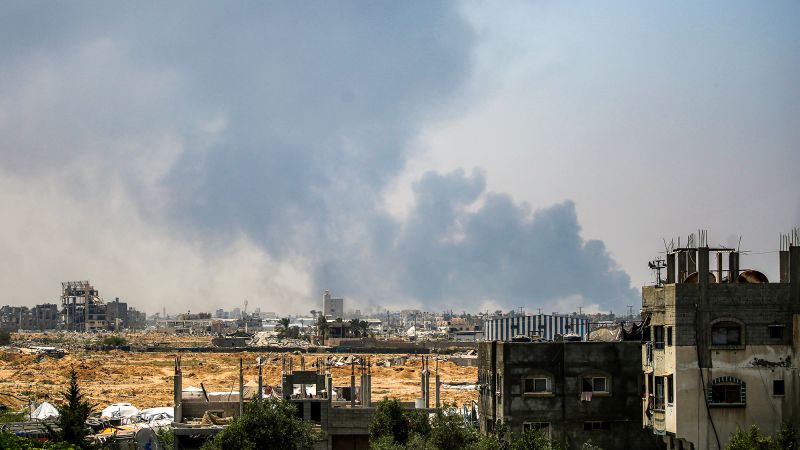The Israeli military has escalated its operations in the Gaza Strip, launching a ground offensive in Deir al-Balah, a critical area that had previously endured less direct conflict. This significant military maneuver
Did You Know
The Hawaiian alphabet has only 13 letters.
?
AD
comes after 21 months of escalating tensions and violence in the region, with reports indicating heavy airstrikes and military presence, including tanks pushing into the city. As evacuation orders were issued to local residents, both humanitarian organizations and families of hostages voiced urgent concerns over the risks posed to civilians amid the intensifying conflict.
Eyewitness accounts detail relentless airstrikes targeting strategic locations, raising fears for the safety of civilians. The World Health Organization has condemned recent assaults on its facilities, claiming that such actions severely compromise essential humanitarian aid efforts. With reports of starvation impacting the population, humanitarian agencies warn that the increasing violence could lead to a devastating humanitarian crisis, particularly affecting children and displaced individuals struggling for basic necessities.
As international calls for a ceasefire amplify, the situation in Gaza grows ever more dire. Leaders from various nations highlight the urgency to protect non-combatants and restore humanitarian access. The escalating violence not only threatens the stability of Gaza but also has far-reaching consequences for regional peace and security. With hostages potentially caught in the crossfire, the need for dialogue and immediate intervention has never been more critical, urging the global community to act before it is too late.
Q&A (Auto-generated by AI)
What are the implications of the ceasefire?
A ceasefire in the ongoing conflict would halt hostilities, allowing humanitarian aid to reach affected civilians in Gaza, particularly in areas like Deir al-Balah, which have faced significant military incursions. It would also provide a platform for negotiations aimed at a longer-term peace settlement. However, the effectiveness of a ceasefire depends on the commitment of both parties to adhere to it and the international community's role in monitoring compliance. Past ceasefires have often been fragile, leading to renewed violence.
How has Deir al-Balah's history shaped its conflict?
Deir al-Balah has historically been a strategic location in Gaza, serving as a stronghold for Hamas. Its geography and population density make it a focal point in the current conflict, as military operations here can have significant implications for both military strategy and civilian safety. The area's past experiences with conflict, including previous Israeli military operations, have contributed to its current humanitarian crises, as many residents have been displaced multiple times.
What role does WHO play in conflict zones?
The World Health Organization (WHO) plays a critical role in conflict zones by coordinating health responses, providing medical supplies, and ensuring access to healthcare for affected populations. In Gaza, WHO has been vocal about the impacts of military actions on health facilities and staff, as seen in the recent attacks on its premises in Deir al-Balah. The organization advocates for the protection of healthcare workers and infrastructure, emphasizing the importance of humanitarian access during armed conflicts.
How do evacuation orders affect civilians in Gaza?
Evacuation orders in Gaza significantly impact civilians, often forcing them to leave their homes under duress, leading to increased displacement and humanitarian crises. Families may be separated, and access to basic necessities like food and medical care is severely compromised. In Deir al-Balah, where many residents have already been displaced, such orders exacerbate the existing humanitarian situation, putting lives at risk and contributing to trauma and instability within the community.
What are the humanitarian impacts of the war?
The humanitarian impacts of the war in Gaza are severe, with thousands killed and many more injured. Access to food, clean water, and medical care has been critically hampered due to ongoing military operations, particularly in areas like Deir al-Balah. The UN and various humanitarian organizations report rising malnutrition and health crises among the population. Displacement of families and destruction of infrastructure further complicate relief efforts, leading to long-term consequences for the region's stability.

















